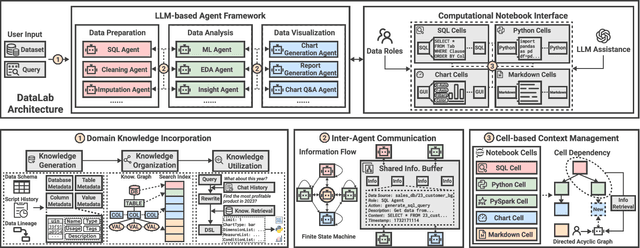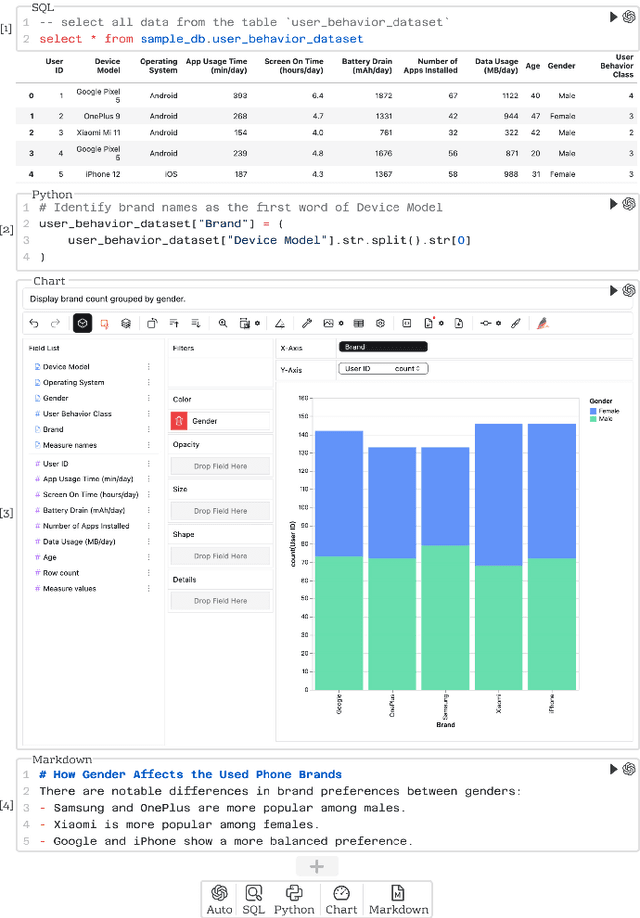Zhuo Chang
DataLab: A Unified Platform for LLM-Powered Business Intelligence
Dec 04, 2024



Abstract:Business intelligence (BI) transforms large volumes of data within modern organizations into actionable insights for informed decision-making. Recently, large language model (LLM)-based agents have streamlined the BI workflow by automatically performing task planning, reasoning, and actions in executable environments based on natural language (NL) queries. However, existing approaches primarily focus on individual BI tasks such as NL2SQL and NL2VIS. The fragmentation of tasks across different data roles and tools lead to inefficiencies and potential errors due to the iterative and collaborative nature of BI. In this paper, we introduce DataLab, a unified BI platform that integrates a one-stop LLM-based agent framework with an augmented computational notebook interface. DataLab supports a wide range of BI tasks for different data roles by seamlessly combining LLM assistance with user customization within a single environment. To achieve this unification, we design a domain knowledge incorporation module tailored for enterprise-specific BI tasks, an inter-agent communication mechanism to facilitate information sharing across the BI workflow, and a cell-based context management strategy to enhance context utilization efficiency in BI notebooks. Extensive experiments demonstrate that DataLab achieves state-of-the-art performance on various BI tasks across popular research benchmarks. Moreover, DataLab maintains high effectiveness and efficiency on real-world datasets from Tencent, achieving up to a 58.58% increase in accuracy and a 61.65% reduction in token cost on enterprise-specific BI tasks.
DataLab: A Unifed Platform for LLM-Powered Business Intelligence
Dec 03, 2024



Abstract:Business intelligence (BI) transforms large volumes of data within modern organizations into actionable insights for informed decision-making. Recently, large language model (LLM)-based agents have streamlined the BI workflow by automatically performing task planning, reasoning, and actions in executable environments based on natural language (NL) queries. However, existing approaches primarily focus on individual BI tasks such as NL2SQL and NL2VIS. The fragmentation of tasks across different data roles and tools lead to inefficiencies and potential errors due to the iterative and collaborative nature of BI. In this paper, we introduce DataLab, a unified BI platform that integrates a one-stop LLM-based agent framework with an augmented computational notebook interface. DataLab supports a wide range of BI tasks for different data roles by seamlessly combining LLM assistance with user customization within a single environment. To achieve this unification, we design a domain knowledge incorporation module tailored for enterprise-specific BI tasks, an inter-agent communication mechanism to facilitate information sharing across the BI workflow, and a cell-based context management strategy to enhance context utilization efficiency in BI notebooks. Extensive experiments demonstrate that DataLab achieves state-of-the-art performance on various BI tasks across popular research benchmarks. Moreover, DataLab maintains high effectiveness and efficiency on real-world datasets from Tencent, achieving up to a 58.58% increase in accuracy and a 61.65% reduction in token cost on enterprise-specific BI tasks.
A Unified and Efficient Coordinating Framework for Autonomous DBMS Tuning
Mar 10, 2023Abstract:Recently using machine learning (ML) based techniques to optimize modern database management systems has attracted intensive interest from both industry and academia. With an objective to tune a specific component of a DBMS (e.g., index selection, knobs tuning), the ML-based tuning agents have shown to be able to find better configurations than experienced database administrators. However, one critical yet challenging question remains unexplored -- how to make those ML-based tuning agents work collaboratively. Existing methods do not consider the dependencies among the multiple agents, and the model used by each agent only studies the effect of changing the configurations in a single component. To tune different components for DBMS, a coordinating mechanism is needed to make the multiple agents cognizant of each other. Also, we need to decide how to allocate the limited tuning budget among the agents to maximize the performance. Such a decision is difficult to make since the distribution of the reward for each agent is unknown and non-stationary. In this paper, we study the above question and present a unified coordinating framework to efficiently utilize existing ML-based agents. First, we propose a message propagation protocol that specifies the collaboration behaviors for agents and encapsulates the global tuning messages in each agent's model. Second, we combine Thompson Sampling, a well-studied reinforcement learning algorithm with a memory buffer so that our framework can allocate budget judiciously in a non-stationary environment. Our framework defines the interfaces adapted to a broad class of ML-based tuning agents, yet simple enough for integration with existing implementations and future extensions. We show that it can effectively utilize different ML-based agents and find better configurations with 1.4~14.1X speedups on the workload execution time compared with baselines.
 Add to Chrome
Add to Chrome Add to Firefox
Add to Firefox Add to Edge
Add to Edge